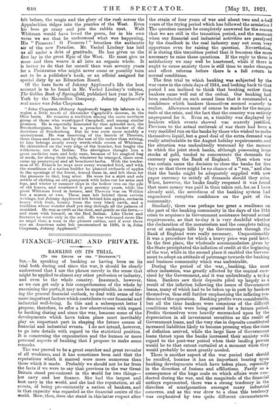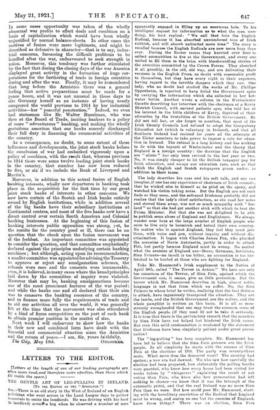FINANCE-PUBLIC AND PRIVATE.
BANKING ON ITS TRIAL.
[To THE EDITOR OP THE " SPECTATOR-"] SIR,—In speaking of banking as having been on its trial both during and since the war, it should be clearly understood that I use the phrase merely in the sense that might be applied to almost any other profession or industry, and even to the whole country. Inasmuch, however, as we can get only a fair comprehension of the whole by examining the parts, it may not be unprofitable, in consider- ing the general financial outlook, to deal with some of the more important factors which contribute to our financial and industrial well-being. In this and a subsequent letter I propose, therefore, to offer a few observations with regard to banking during and since the war, because some of the developments which have taken place must inevitably play an important part in shaping the future course of financial and industrial events. I do not intend, however, to go into details with regard to the statistical position. It is concerning the organization and the human or more personal aspects of banking that I propose to make some remarks.
The war proved to be a great searcher and great revealer of all weakness, and it has sometimes been said that the reputations which it marred were more numerous than those which it made. Probably we should not be far from the facts if we were to say that previous to the war Great Britain stood pre-eminent in the world for two things— her navy and her finance. She had the largest and beat navy in the world, and she had the reputation, at all events, of being pre-eminently a nation of bankers, and in that capacity was regarded as the financial centre of the world. How, then, does she stand in this latter respect after the strain of four years of war and about two and a-half years of the trying period which has followed the armistice ?
The question cannot be completely answered for the reason that we are still in the transition period, and the moment when our financial and industrial activities are paralysed by the deadlock in the coal industry may not seem very opportune even for raising the question. Nevertheless, it is during this transition period that it becomes the more necessary to raise these questions. If the reply to them is satisfactory we may well be heartened, while if there is aught to cause anxiety there is still time to make changes and effect reforms before there is a full return to normal conditions.
The first trial to which banking was subjected by the war came in the crisis days of 1914, and looking back to that period I am inclined to think that banking rather than bankers came well out of the ordeal. Our banking had been conducted on such sound lines that it commanded a confidence which bankers themselves seemed scarcely to realize. Allowance must of course be made for the magni- tude of the crisis, and the fact that the country was entirely unprepared for it. Even so, a timidity was displayed by bankers which events showed was scarcely justified. Previous to the actual outbreak of war there had been a very modified run on the banks by those who wished to make themselves liquid, but a good deal of the extra demand was really attributable to the August holiday requirements, and the situation was undoubtedly worsened by the manner in which the joint stock banks, although possessing large stocks of gold, tended to concentrate the demands for currency upon the Bank of England. Then when war was certain came the decision to close the banks for five days so that there might be no chance of a "run," and also that the banks might be adequately supplied with new paper currency to satisfy all demands should they arise. When, however, the banks finally reopened it was found that more money was paid in than taken out, for, as I have already said, the soundness of the banking system had engendered complete confidence on the part of the community.
Similarly, there was perhaps too great a readiness on the part of the banking community in the days of the 1914 crisis to acquiesce in Government assistance beyond actual requirements, so that to-day it is very doubtful whether the declaration of the moratorium and the complete taking over of exchange bills by the Government through the Bank of England were really necessary. Unquestionably it was a procedure for which a heavy price was paid later. In the first place, the wholesale accommodation given by the State precipitated the inflation of credit at the beginning of the war, while in the second place it enabled the Govern- ment to adopt an attitude of patronage towards the banking and business community which was undesirable.
During the period of the war, banking, like most other industries, was greatly affected by the control- exer- cised by the Government, and it was undoubtedly a tr) lag time. Bankers saw their deposits piled up largely as a result of the inflation following the issues of Government loans, many of which had to be taken up in part by bankers themselves, thus still further emphasizing the inflating ten- dencies of the operation. Banking profits were considerable, but all the time bankers were conscious of the difficult conditions which were being created for a future. period. Profits themselves were heavily encroached upon by the depreciation in all investment securities as the result of Government loans, and the very rise in deposits constituted increased liabilities likely to become pressing when the time of deflation arrived, while the large lines of Government loans thrust upon the banks increased their anxiety with regard to the post-war period when their lending powers would be to that extent curtailed at a moment when they would probably be most greatly needed. There is another aspect of the war period that should be recalled, because it has an important bearing upon banking developments which have taken place, especially in the direction of fusions and affiliations. Partly as a consequence of the huge scale on which affairs were con- ducted during the war, and the magnitude of the financial outlays represented, there was a strong tendency in the direction of amalgamation amongst many industrial concerns, and as the war drew to a close this tendency was emphasized by two quite different circumstances. In some oases opportunity was taken of the wholly abnormal war profits to effect deals and combines on a basis of capitalization which would have been wholly unjustified by normal balance-sheets. In other cases the motives of fusion were more legitimate, and might be described as defensive in character—that is to say, indus- trial concerns, foreseeing the difficult problems to be handled after the war, endeavoured to seek strength in union. Moreover, this tendency was further stimulated by the faot that during the closing days of the war America displayed great activity in the formation of huge cor- porations for the furthering of trade in foreign countries during and after the war. Finally, it may be remembered that long before the Armistice there was a general feeling that active preparations must be made for a peace boom, and it was not unusual in those days to cite Germany herself as an instance of having nearly conquered the world previous to 1914 by her industrial activities—her " peaceful penetration." Indeed, we even had statesmen like Mr. Walter Runciman, who was then at the Board of Trade, inciting bankers to a policy of more " adventurous " banking, and making the wholly gratuitous assertion that our banks scarcely discharged their full duty in financing the commercial activities of the country.
As a consequence, no doubt, to some extent of these influences and developments, the joint stock banks before the conclusion of war had embarked vigorously upon a policy of combines, with the result that, whereas previous to 1914 there were some twelve leading joint stock banks in the country, that number has now been reduced to five, or six if we include the Bank of Liverpool and Martin's.
Moreover, in addition to this actual fusion of English banking interests, wholly new departures in banking took jlace in the acquisition for the first time by our great oint -stock banks of interests in other concerns. We now have certain of the Scotch and Irish banks entirely owned by English institutions, while in addition several of the big banks have their subsidiary institutions at Continental centres, and most of the five banks now have a direct control over certain South American and Colonial banking businesses. At the beginning of this fusion of banking interests public opposition was strong, yet, be the results for the country good or ill, there can be no question that the check upon the fusion movement was of the feeblest. An important committee was appointed to consider the question, and that committee emphatically declared against the principles underlying certain banking combines ; but although, acting upon its recommendation, a smaller committee was appointed for advising the Treasury to approve or reject any amalgamation schemes, the refusals were rare and the consents were innumerable, even, it is believed, in many cases where the broad principles laid down by the committee of inquiry were violated. However that may be, banking amalgamations became one of the most prominent features of the war period; and while the banks one and all declared that their aim was to conserve the banking resources of the country, and to finance more fully the requirements of trade and to aid our activities all over the world, it was generally felt at the time that the movement was also stimulated by a kind of fierce competition on the part of each bank to obtain premier position in the matter of size. Next week I will endeavour to show how the banks in their new and combined form have dealt with the financial and commercial situation since the Armistice and the return of peace.—I am, Sir, yours faithfully,



































 Previous page
Previous page